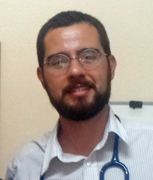TARGA, Asst Prof Leonardo Vieira
Brazil : rural family doctor

What work are you doing currently?
I've been working and living for ten years in the same rural area in South Brazil, as a family and community physician. It is an area of German immigration of small farmers (for about a century). Here I have the excellent opportunity of working with medical students and residents of family medicine. I am also Assistant Professor in the Universidade de Caxias do Sul, which has a good community engagement and supports our rural work and some research in the area.
I am coordinating the Brazilian Working Party on Rural Health of the Brazilian Society of Family Medicine. We are hosting the next WONCA Rural Health Conference, in Gramado, 2014. (please see www.sbmfc.org.br/woncarural ). This group are doing great work in Brazil: bringing new perspectives on national and regional production in rural health; stimulating discussions at conferences; uniting remote professionals; translating WONCA rural documents to Portuguese. I am very happy and honoured to represent this group and the Scientific Society on the WONCA Working Party on Rural Practice which qualifies our national work and serves as an inspiration.
Other interesting things you have done previously?
I worked a short time in the Amazon region with the indigenous peoples. Besides being a great professional and life experience, helped me to understand the challenges of rural medicine in situations with great diversity and difficulties. I also worked for some years in very poor regions, on the outskirts of cities. These regions share some problems with rural areas and also present major challenges, especially in developing countries such as Brazil.
Recently, I finished a Masters in Social Anthropology with a Health and Culture focus. This is very important to my everyday work since intercultural competence is essential to primary care and community work.
What are your interests in work and outside work?
In work, rural health and medical anthropology are my main interests. Outside work, I spend time with my family, I read a lot, play guitar and work in garden and orchard, as I am living now, on a small rural property, like my patients.
What do you like about your interactions in WONCA?
My connection with WONCA occurs predominantly through the WONCA Working Party on Rural Practice and WONCA conferences. It is wonderful to feel part of a large group of family doctors worldwide and to exchange experiences with rural doctors from the most diverse and remote places on our planet.
In 2014, WONCA will give us (in Brazil) the opportunity to host the WONCA World Rural Health Conference, the first in Latin America.
This will be very important to raise issues and deepen themes like retention and recruitment of rural health professionals, quality of care in rural areas, rural training, indigenous health, tropical diseases, etc. All these topics have local peculiarities and Latin America has some important experiences to share and also a lot to learn from other countries. We hope this will be a great opportunity to study and learn but also to celebrate our work.
What can you tell us about being a rural family doctor in Brazil?
We work in health teams in Brazil. The rural teams are usually small with one doctor, one nurse, two nurse assistants and five health community workers. We have a dentist half time, and support from a physical educator, psychologist and social worker.
My health unit is 17km from a small city (of 19,000 habitants) with a small hospital and 40km from medium urban centres with more resources. The community we serve is 2000 people. The activities in the community besides individual and family consults consist of home visits, small ambulatory surgeries, educational activities in schools, community centres and places of work based on epidemiologic data and local health needs. Students and residents have the opportunity to do all the activities listed and know more about the health system of a smaller city. They do short rotations of three to four weeks.
Living near my patients helps me to be more adequate as a physician and to understand better the local problems and has also advantages and a good quality of life. Cultural issues are very important in a country like Brazil, with enormous human diversity and two of my challenges were to learn how to speak a little German to better communication and also to study traditional medicines and herbs.
People who wants to know more about our situation will be welcome to visit my health unit and community, in 2014. We are planning some visits to many services in different settings in conjunction with the WONCA Rural Health Conference.